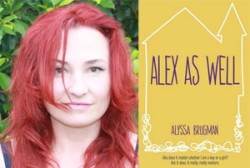Alex as Well
Published on: 03 June 2014 Author: Alyssa Brugman
Why aren't there more YA books about transgendered, cross-dressing or intersex teens? Author Alyssa Brugman talks about writing trans and intersex characters, creating authentic voices and the need for more representation in teen and children's literature.

Young people who experiment with gender, who identify as neither or both gender in various ways, are not much discussed in young adult fiction, which seems very odd when gender, sexual awareness and identity make up so much of the rest of young adult fiction. It doesn't make any sense, does it?
Why aren't there more YA books about transgendered, cross-dressing or intersex teens? I don't know the answer, but there aren't, so I wrote one - and I'm glad for this opportunity to tell you a bit about how I came to write my little book.
Alex as Well
Alex is about fourteen and has decided that she can no longer live as a male. When she enrols in a new school Alex starts to experiment with her new gender. Her exploration is hampered by her parents, and in particular her mother, who is having difficulty coping with Alex's decision.
'Five days ago I stopped taking my medication. I think it might be one of those decisions. How do you know? Maybe if I just start taking them again everything will go back to the way it was?
I don't think so.'
The light-bulb moment happened in the car. The writer Jane McCredie was on the radio talking about her book Making Boys and Girls, which is about the science and psychology of gender. She said something like, 'gender isn't a dichotomy, it's a spectrum'.
Unreliable narration in young adult fiction
At the time I was working on a PhD in literature. My area of study was unreliable narration in young adult fiction. I wanted to know how I could let the reader know what was going even though my young character shouldn't really have the emotional maturity to understand either themselves, or the motives of others. I incorporated a number of the narrative strategies that I studied in the PhD into this manuscript.
There are places, for example where I've played with the text itself as an artefact. There are places where Alex refers to the text itself (metafiction). There are multiple focalisers, including an imaginary friend, and an internet group act as a Greek chorus, reflecting a range of possible responses to Alex's mother's confessions that she makes online. There are others which you will come across yourself if you decide to read this book.
So initially, the book was a technical exercise in a spot where there appeared to be a gap. But I wouldn't want you to imagine that I write anything with a kind of calculated cynicism. All of my books so far have had friction between generations - a sense of injustice, frustration, as well as exploration, wonder and exuberance. Adolescence is a whirlwind. Alex as Well has this friction too, except with an intersex character. I didn't really talk about the technicalities of her gender, because that's not the story.
Finally - a vegetarian character in YA!
I didn't have to build Alex from scratch - it was as if she already existed, and I only had to put the words down. I hope that you will have the same sensation reading this book - as if Alex is there next to you whispering in your ear.
The feedback that I'm getting so far from readers is that, now that they've met Alex, somehow they feel that they should have read this story before. In fact, there was one reader who wrote something like, 'so good to read a vegetarian character in YA', as if that was the attribute that stood out.
It seems to me too, that these books should have been here all along. I hope that in years to come that it's common enough to be unremarkable.






Add a comment